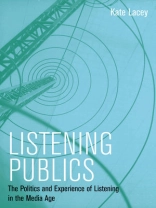In focusing on the practices, politics and ethics of listening, this wide-ranging book offers an important new perspective on questions of media audiences, publics and citizenship. Listening is central to modern communication, politics and experience, but is commonly overlooked and underestimated in a culture fascinated by the spectacle and the politics of voice.
Listening Publics restores listening to media history and to theories of the public sphere. In so doing it opens up profound questions for our understanding of mediated experience, public participation and civic engagement.
Taking a cross-national and interdisciplinary approach, the book explores how listening publics have been constituted in relation to successive media technologies from the invention of writing to the digital age. It asks how new practices of listening associated with sound and audiovisual media transform a public world forged in the age of print.
Through detailed histories and sophisticated theoretical analysis, Listening Publics demonstrates the embodied and critical activity of listening to be a rich concept with which to rethink the practices, politics and ethics of media communication.
Table of Content
Acknowledgements
Preface
Listening overlooked
Chapter 1 Listening in and listening out
Chapter 2 The modernisation of listening
Listening in the age of spectacle
Chapter 3 Listening in good faith: recording, representation and the real
Chapter 4 Listening amid the noise of modernity
Chapter 5 Listening live: the politics and experience of the radiogenic
Ways of listening
Chapter 6 The privatisation of the listening public
Chapter 7 The politics and practices of collective listening
Listening in the public sphere
Chapter 8 The public sphere as auditorium
Chapter 9 Media and the ethics of listening
Endnotes
Bibliography
Index
About the author
Kate Lacey is senior lecturer in media and cultural studies at the University of Sussex.











